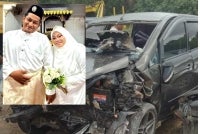Baby dumping still rampant

KUALA LUMPUR - Malaysia is not short of tragic stories of newborns being dumped in toilets, drains, rubbish bins and burned beyond recognition. In a heart-wrenching incident, a newborn baby boy was found dead with stab wounds in a house in Kemaman, Terengganu on Tuesday, Feb 8, this year.
Police have detained the 15-year-old mother, who is allegedly a rape victim. Kemaman district police said preliminary examination found stab wounds on the left of the baby’s chest from a sharp object.
Another shocking incident took place in Penang when a college student threw her newborn baby girl from the 13th floor of her family's apartment unit at Bandar Baru Farlim, Air Itam, Georgetown on July 10, 2020.
The normal baby girl, who died from severe head injuries, was found at 8.18am by residents, who later informed the police. Following preliminary investigation, both the 18-year old girl and her boyfriend were then detained by the police.
It appears that the horrifying trend of abandoning or disposing foetus and newborn, widely known as baby dumping, is still rampant in Malaysia despite various measures to curb an increasingly serious social illness, especially among youths, who had no qualms about their criminality.
Bukit Aman Sexual, Women and Child Investigations Division principal assistant director Assistant Commissioner Siti Kamsiah Hassan shared insights into baby dumping in an interview with Bernama journalist Balkish Awang recently.
443 CASES OF DUMPED BABIES
Based on PDRM statistics, at least 10 babies were dumped within a month for the past four years from 2018 to 2021.
According to Siti Kamsiah, police received 128 cases of babies dumped nationwide in 2018 followed by 125 in 2019, 104 in 2020 and 86 in 2021, bringing the cumulative total to 443.
"Looking at the figures, there is only a slight decline in cases, it is not significant. In my view, it is still at the same average level. The difference between 2018 and 2019 is only three cases. The slight fall in 2020 and 2021 was attributed to the movement control order (MCO) since March 2020 with many sectors closed.
"Travel and social gathering restrictions during the MCO saw a slight reduction in baby dumping cases with no incidents of out-of-wedlock childbirths, in addition to office closures which also curtailed physical activities. But for me, the 2018-2021 figures are still high with an average 10 dumped baby cases a month," she said.
To a question, Siti Kamsiah said with the lifting of restrictions and the resumption of social and economic activities, the potential of baby dumping cases to re-emerge are there.
Elaborating on the issue, she said of 443 dumped baby cases, 149 were found alive while 294 babies were dead.
"During the period (2018 to 2021), 141 cases involved foetuses while 302 were babies dumped right after being born. While gender-wise, 141 were infant boys, 114 girls and 188 were unknown," she said.
PANIC, RESORT TO DISPOSING EVIDENCE
According to Siti Kamsiah who has served PDRM for 31 years, the perpetrators who resorted to committing the heinous crime, had earlier planned to dispose of their babies after birth.
"Based on PDRM investigation records, baby dumping cases take place due to the first factor, that is out-of-wedlock pregnancy, which means the victim or suspect becomes pregnant and later dumps the baby.
In most cases, they are involved in premarital sex, forcing them to dump their babies as they are not ready and without parental knowledge.
"To avoid parental knowledge, the overwhelmed suspect, in the advanced stage of pregnancy, would hit the panic button and decided to remove the evidence. Fearing that other people especially their family members would know the truth, they then committed these heartless acts," she added.
She said that based on the dumped sites, the perpetrator would usually find a place that is not likely to be easily detected by the public, such as garbage disposals, sewerage sites, near drains or places that are not equipped with the closed-circuit television (CCTV) so that all traces of evidence will be completely destroyed.
In addition, most of the cases of baby dumping were found in residential areas, residential outskirts and mosques so that the babies can be saved.
According to PDRM statistics, from 2018 to 2021, the highest number of dumped baby sites were recorded in housing areas, with 178 cases, followed by plants (31), drains and sewerage sites (31), toilets (30) mosques and suraus (29), near shops, buildings and offices (26) and roadsides (21).
HIGHEST AGE GROUP 18 TO 25 YEARS
On the age group of suspects of this brutal crime, Siti Kamsiah said, for the period 2018 to 2021, the highest number with 149 cases involved those between 18 to 25, while 73 cases were in the age bracket of above 25 and 40 cases were in the age group of below 18.
"Most of the suspects above 18 were those who have just started working life, living on their own, away from their families and they were free from their parents' watchful eyes. Those with weak self values and poor religious upbringing were more susceptible to committing such crimes," she said.
For those below 18, Siti Kamsiah said baby dumping occurrences were slightly less as the babies were saved from being dumped in the early stages.
"For those aged 14 to 16 years, we could see their maturity level was rather limited. They did not understand the changes taking place in their body or they were not aware that they were pregnant until the eleventh hour when they were about to deliver their baby and was detected by their parents or the doctor during medical examination.
Hence, the risk of the baby being dumped is less with parental knowledge at this stage," she added.
Siti Kamsiah said that their case is different from those in the 18 to 25 age category who are already mature and are not staying with their family.
"For this age cluster, they have already planned what they wanted to do before the baby is born. When they become pregnant, they would hide their pregnancy until a stage when they have the next course of action all planned, that is to dispose of the baby.
Baby dumping, she said, is also due to the individual's inability to conform to good values, especially with the right and wrong in human behaviour.
She said mostly, babies are dumped by their unwed mother and secondly by the suspect's boyfriend.
THREATENS LIFE, MORAL VALUES
While baby dumping is the lowest among the Sexual, Women and Children (D11) crime, it should not be taken lightly as it threatens the life of an innocent child.
"Under the D11 crime, the highest case recorded is rape cases followed by sodomy and oral sex. While statistics show that there are not many baby dumping cases, the act itself involves lives and is tied to moral values. Baby dumping is a crime and all acts that expose children to danger are prohibited under the law.
"Dumping babies also brought to light other immoral activities such as premarital sex.This is what we are worried of, it seems small but the impact is large as it affects lives," she said.
Meanwhile, Siti Kamsiah said PDRM will not compromise on matters related to baby dumping cases.
"Whenever a report is lodged and a baby is found, PDRM will conduct an investigation. This is our commitment so that those found guilty of the offence will be brought to justice; it will serve as a lesson for others not to take the same route," she said.
To tackle the issue at hand, she said PDRM has also organised an awareness campaign among the community on the scourge, including the consequences of being involved in activities that could result in pregnancy out-of-wedlock and baby dumping.
"The crime awareness campaign is focused on target groups such as children, women and the community. It is an ongoing campaign held throughout the year in cooperation with various agencies and it was held since the setting up of the D11 (Sexual/Children Investigations) Division in 2007," she added. - BERNAMA
Download Sinar Daily application.Click Here!














